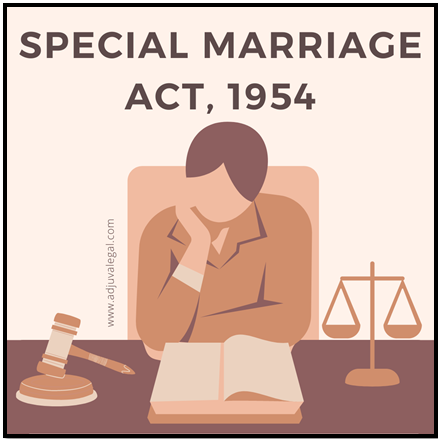PERSONAL LAW NORMS CANNOT BE USED TO INVALIDATE INTER-FAITH MARRIAGES
SYLLABUS:
GS 1:
- Social empowerment, communalism, regionalism & secularism.
Focus:
- The Madhya Pradesh High Court’s order ruling declining to give protection to a couple on the ground that a marriage between a Muslim man and Hindu woman will not be valid, even if registered under the Special Marriage Act
Source: Adjuva Legal
The Special Marriage Act (SMA), 1954, was enacted to provide a secular framework for the marriage of individuals irrespective of their religious affiliations, thereby upholding the constitutional ethos of secularism. However, recent judicial misinterpretations of this Act, such as the Madhya Pradesh High Court’s ruling on the validity of an inter-faith marriage under personal religious laws, have raised concerns about the judiciary’s role in preserving the secular framework.
What is the Special Marriage Act?
|
Misunderstanding the Law
- Ignorance No Excuse: The principle that ignorance of the law is no excuse also applies to judges, which was evidently overlooked in the Madhya Pradesh High Court’s decision.
- Misapplication of Personal Law: The judge wrongly used Muslim personal law to assess the validity of an inter-faith marriage registered under the Special Marriage Act (SMA), 1954.
- Irrelevant Considerations: The court inappropriately considered whether the marriage would be valid under Muslim law, despite the couple’s intention to register under the SMA.
- Incorrect Legal Standards: By examining Muslim law treatises, the judge concluded that a Muslim cannot marry a Hindu, labeling such a union as irregular, which misinterprets the SMA’s purpose.
- Legal Confusion: The ruling reflects a fundamental misunderstanding of the SMA, which was designed to permit inter-faith marriages without adhering to religious marital rituals.
Special Marriage Act’s Role
- Purpose of SMA: The SMA was specifically enacted to allow inter-faith couples to marry legally without fulfilling the traditional requirements of their respective religions.
- Supremacy of SMA: The Act is intended to supersede personal religious laws where it is applicable, enabling secular unions.
- Protection of Rights: Under SMA, marriages are valid regardless of non-performance of customary religious rituals, which the judge failed to appreciate fully.
- Salutary Provisions Misinterpreted: The judge incorrectly interpreted the SMA’s provisions on prohibited relationships to mean that inter-faith marriages need to comply with personal laws.
- Bypassing Religious Constraints: SMA serves to eliminate the necessity for religious conversion for the sake of marriage, which the judge’s decision undermines.
Legal Irrelevance
- Irrelevant Questions: The question of whether an inter-faith marriage is valid under Muslim law is irrelevant when a couple opts for marriage under the SMA.
- Focus on Protection: The couple sought police protection to register their marriage, which the court overlooked by delving into personal law validity.
- Overstepping Judicial Role: The court’s role was to ensure the couple’s safety and facilitate their legal marriage registration, not to validate the marriage based on religious laws.
- Misdirected Legal Analysis: The analysis of Muslim personal law was unnecessary and inappropriate for the legal issue at hand.
- Distraction from Real Issues: The focus on religious law distracted from the primary legal concern of protecting the couple’s rights under the SMA.
Implications for Secularism
- Threat to Secular Principles: Imposing religious personal law on those opting for secular marriages via the SMA threatens the secular foundations of Indian law.
- Undermining SMA: Allowing such judgments to stand could render the SMA superfluous, contradicting its very purpose.
- Encouragement of Conversion: If upheld, this judgment could pressure inter-faith couples into converting simply to legitimize their marriage, an outcome the SMA aims to prevent.
- Privileging Religious Law: The decision privileges Muslim personal law over the secular SMA, which could lead to legal inconsistencies and inequalities.
- Barrier to Uniform Civil Code: Such judgments could hinder any progress towards a uniform civil code by reinforcing religious legal frameworks over secular laws.
Uniform Civil Code (UCC) Overview
|
Judicial Accountability
- Judicial Error: The judgment demonstrates a significant judicial error in the application of the law concerning inter-faith marriages.
- Need for Correction: It is imperative for higher courts to correct this misinterpretation to uphold the integrity of the legal system.
- Training and Awareness: This case highlights the need for better legal training and awareness among judges regarding the application of secular laws like the SMA.
- Protecting Judicial Credibility: Ensuring judges understand and correctly apply laws like the SMA is crucial for maintaining judicial credibility and public trust.
- Preventing Misjudgments: Judicial misjudgments like this could have far-reaching negative implications on social harmony and legal fairness, emphasizing the need for accurate legal interpretations.
Source:The Hindu
Mains Practice Question:
Discuss the implications of judicial misunderstandings in the interpretation of secular laws like the Special Marriage Act (SMA) on the secular fabric of the nation. Illustrate your answer with examples from recent court rulings.
Associated Articles:




